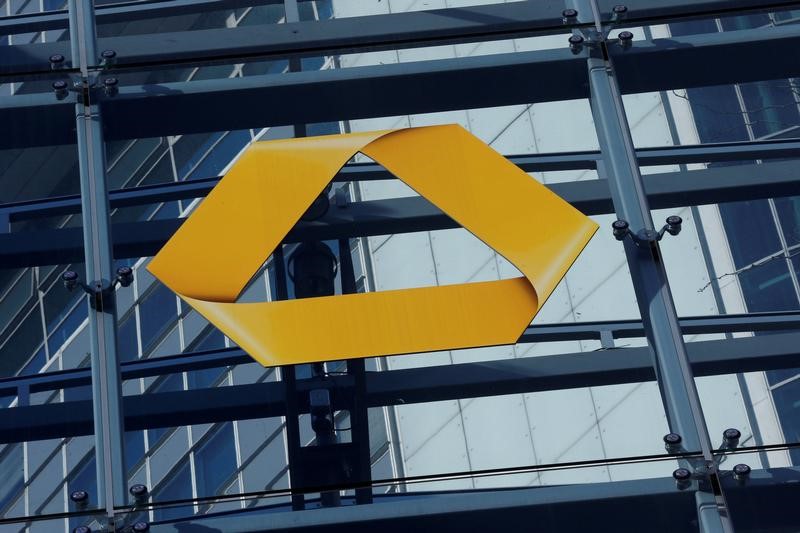By Tom Arnold and Stanley Carvalho
DUBAI (Reuters) - Commerzbank (DE:CBKG) has told customers in the Gulf it will no longer process their transactions in euros, four Gulf banking sources say, joining other big banks that cut such services after being fined for dealings with Iran.
Major U.S. and European peers have been tightening risk controls in the region after U.S. regulators imposed billions of dollars of penalties on banks in recent years over lapses relating to money laundering and terror financing.
The Gulf, as a close neighbor of Iran and Syria which are subject to U.S. sanctions, has come under close scrutiny from regulators at the same time as an oil price slump has made doing business in the region less profitable.
While sanctions against Iran eased at the start of this year under a global nuclear deal, U.S. President-elect Donald Trump has warned he would scrap the agreement, adding to banks' worries about the region.
Commerzbank, which is partly owned by the German government, told clients in the region in recent weeks that it would no longer clear euro deals from Jan. 1 2017, say sources, citing concerns about "compliance".
A spokesman for the bank said: "In individual countries, we ceased to offer certain transaction banking services."
One of the bankers said he believed the German bank might allow exceptions for certain large low-risk clients.
Commerzbank had been in the crosshairs of U.S. authorities. In March 2015, it agreed to pay $1.45 billion after a probe of its dealings with Iran and other sanctioned countries as well as a separate investigation into money laundering controls.
It is one of several banks including Citigroup (NYSE:C), JPMorgan Chase & Co, BNP Paribas (PA:BNPP) and HSBC which have been fined in recent years by U.S. regulators, partly as a result of business in the Middle East.
CONFIDENCE CRISIS
The trend has left some Gulf banks and exchange houses struggling to get U.S. dollars and euros, the top two world currencies.
"Correspondent banks have been facing a confidence crisis when it comes to banks in the Middle East," says Samer Tamimi, chief executive of UAE-based United Arab Bank (UAB) (AD:UAB).
"We used to use around 12 banks for clearing euros and now only 1 to 2 banks," said one of the sources, a senior Gulf banker, speaking on condition of anonymity.
Clearing, which involves converting payments into dollars or euros, is central to trade. Commerzbank's move is significant because of its long-established presence in the region.
Bankers said it is a key player in the financing of trade flowing between the European Union (EU) and the Gulf Cooperation Council, the EU's fifth largest trading partner with 155.5 billion euros ($162 billion) of goods traded in 2015.
In the Gulf, very few banks are able to settle transactions in dollars directly.
Lawyers warn that the challenge could harden in coming months because of the U.S. Justice Against Sponsors of Terrorism Act, which makes it easier to pursue civil claims against a foreign state for acts of terrorism.
"Middle Eastern banks should expect increasingly close monitoring and scrutiny of their dollar clearing transactions," said Alex Lakatos, a partner in the Washington DC office of Mayer Brown.
At the end of 2013, JPMorgan Chase & Co (N:JPM) cut its correspondent banking relationship with 500 foreign lenders including Al Rajhi <11.20.SE>, Saudi Arabia's second largest bank, according to three people familiar with the matter. An Al Rajhi spokesman said: "The bank has not at any point been found guilty of any wrongdoing with regards to links to terrorism, or fined by any regulatory body for improper conduct."
In the last few months, Citigroup and JPMorgan have told its correspondent banks in the region to stop doing business with money exchange houses or lose access to dollar clearing, according to sources.
Such moves mean few regional banks are willing to do business with exchange houses, say sources. That leaves some fighting to survive as they struggle to access dollars.
Exchange houses allow millions of expatriate workers to send money home. From Saudi Arabia alone, expatriates sent home 157 billion riyals ($42 billion)in 2015.
"We used to do 100 transactions a day and now that's come down to 30 or 20 as some of our dollar channels have closed," said P.M. Umamaheshwaran, who runs UAE-based money exchange business Aziz Exchange Co.

"Our turnover was previously around 2 billion dirhams, but now it's in the millions."